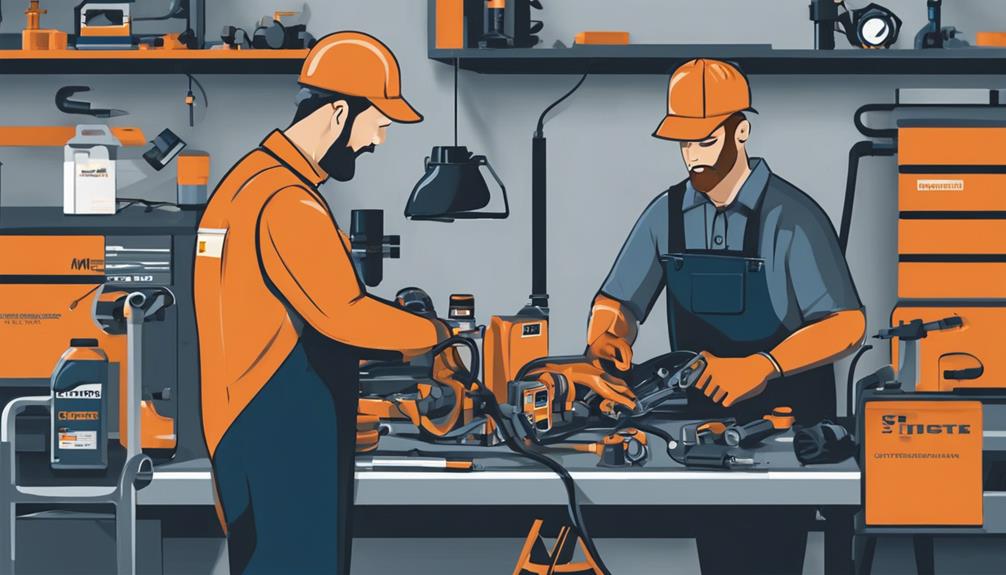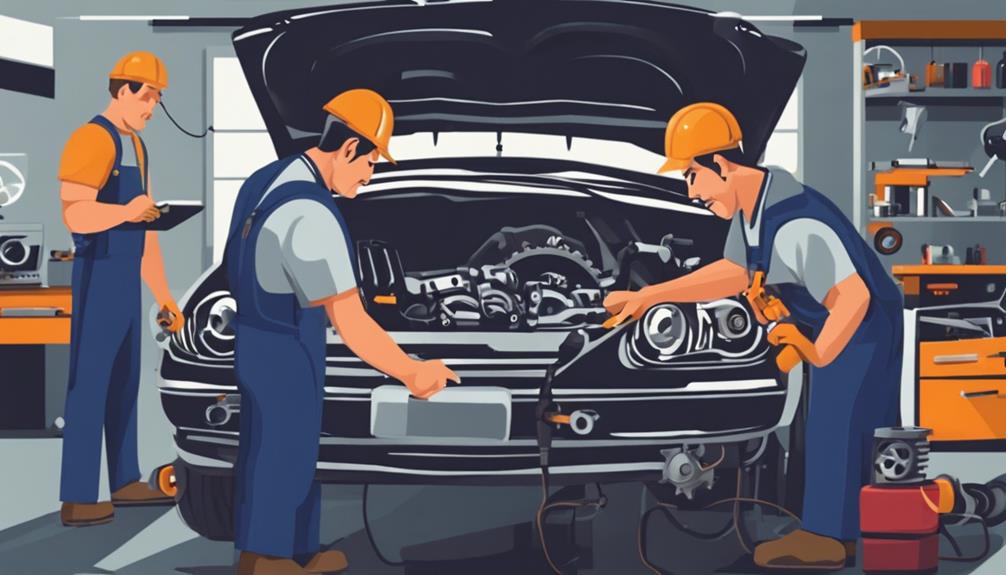For optimizing performance in Brownsville, expert transmission care is essential. Modern vehicles demand precise attention to the transmission system for peak performance and durability. Regular maintenance, fluid level monitoring, and adherence to service schedules are vital. Signs of transmission issues like strange noises or delays should prompt immediate action to prevent further damage. Seeking professional assistance can maximize functionality, prevent costly repairs, and guarantee a smooth driving experience. Professional care, thorough inspections, and preventative measures play a key role in transmission longevity and efficiency. Discover more about expert transmission care for top-notch vehicle performance.
Key Takeaways
- Regular transmission maintenance enhances performance.
- Adhere to manufacturer-recommended service schedules.
- Monitor fluid levels for optimal transmission function.
- Seek professional assistance for expert care.
- Prevent costly repairs with routine inspections.
Importance of Transmission Maintenance
Regular transmission maintenance plays a pivotal role in ensuring the longevity and peak performance of your vehicle's transmission system in Brownsville. Adhering to manufacturer-recommended maintenance schedules is essential for preserving the health of your transmission. Monitoring transmission fluid levels and addressing any issues promptly can greatly extend the lifespan of your transmission. Practices like regular fluid changes and inspections are vital in preventing costly repairs and ensuring top performance. By following maintenance schedules diligently, you can avoid potential transmission problems and maintain safe driving conditions. Prioritizing transmission maintenance not only enhances the overall performance of your vehicle but also helps in avoiding unexpected breakdowns and costly repairs down the line.
Signs of Transmission Problems
Effective monitoring and prompt recognition of specific indicators can help identify potential transmission problems early on. Diagnosing issues such as strange noises while shifting gears, delayed or no response in gear changes, and fluid leaks underneath the vehicle is vital in preventing damage. Addressing these signs promptly with professional assistance can prevent further damage and costly repairs. Ignoring unusual shifting behaviors or fluid leaks can lead to significant transmission issues and expenses. Seeking immediate diagnosis and intervention from experienced technicians is essential to maintain peak performance and extend the lifespan of the vehicle. Regular inspections for leaks in the transmission pan gasket, cooler lines, and seals can help prevent costly repairs and maintain the transmission system's health.
Transmission Repair Vs. Replacement

Comparing transmission repair to replacement involves assessing the extent of damage, cost implications, and the age of the vehicle to determine the most suitable course of action. When faced with transmission issues, taking into account cost and age factors is essential for making an informed decision. Here are key points to take into consideration:
- Cost Considerations:
- Repair costs may vary based on the extent of damage.
- Replacement costs involve purchasing a new transmission unit.
- Evaluate which option aligns with your budget and long-term savings.
- Age Factors:
- Older vehicles may require more extensive repairs.
- Take into consideration the vehicle's age and overall condition when deciding between repair and replacement.
Top Tips for Transmission Care
Monitoring transmission fluid levels regularly is a fundamental practice for excellent transmission care. Fluid checks and maintenance are essential for preventing potential issues and ensuring peak performance. Adhering to preventative measures, such as scheduled fluid changes and regular inspections, can extend the lifespan of your transmission system. Avoiding activities that exceed your vehicle's towing capacity is also important for transmission health. Additionally, scheduling periodic maintenance checks with a professional service provider is recommended to address any emerging concerns promptly. By following these top tips for transmission care, you can maintain the efficiency and longevity of your vehicle's transmission system, ultimately avoiding costly repairs and ensuring safe driving conditions.
Benefits of Regular Maintenance

Regular maintenance plays a significant role in guaranteeing the longevity and peak performance of your vehicle's transmission system. By adhering to regular maintenance schedules, you can experience improved efficiency and significant cost savings in the long run. Here are a few key benefits of regular transmission maintenance:
- Enhanced Efficiency: Regular maintenance keeps all components in prime condition, allowing for smoother gear shifts and improved overall driving performance.
- Cost Savings: Timely inspections and maintenance help detect potential issues early, preventing them from escalating into costly repairs down the road.
- Improved Reliability: Regular care ensures that your transmission operates reliably, reducing the likelihood of unexpected breakdowns or failures.
- Extended Lifespan: Proper maintenance practices contribute to extending the lifespan of your transmission, maximizing its durability and performance.
Professional Transmission Service Benefits
Professional transmission service offers unparalleled benefits for ensuring the longevity and peak performance of your vehicle's transmission system. Efficiency improvements are achieved through precise inspections, fluid checks, and component replacements, optimizing the overall functionality of the transmission. By adhering to recommended service intervals and addressing issues promptly, cost savings are realized by avoiding major repairs or premature transmission failure. Expert technicians conduct thorough diagnostics to identify potential problems early, preventing expensive damages down the line. Investing in professional transmission service not only enhances the efficiency of your vehicle but also leads to long-term cost-effectiveness by maintaining the health of the transmission system. Trusting experienced professionals for your transmission care can ultimately result in a smoother driving experience and extended lifespan for your vehicle.
Common Transmission Issues

Identifying common transmission issues is crucial for maintaining the peak performance and longevity of your vehicle's transmission system. When it comes to transmission troubleshooting, understanding the signs and symptoms early on can help you avoid costly repairs down the road. Here are some preventative measures and DIY transmission maintenance tips to keep your transmission in top shape:
- Regularly check transmission fluid levels and quality.
- Adhere to recommended service intervals for fluid changes.
- Avoid common mistakes like towing beyond your vehicle's capacity.
- Schedule routine maintenance checks to catch any issues early on.
Taking proactive steps in transmission care can help you prevent major problems and guarantee the longevity of your vehicle's transmission.
Expert Care for Transmission Longevity
What essential practices contribute to maximizing the longevity of a vehicle's transmission system? Transmission diagnostics and preventative measures play a critical role in safeguarding the durability of your transmission. Regular transmission diagnostics help identify potential issues early on, allowing for timely intervention and prevention of major problems. Monitoring transmission fluid levels and adhering to recommended service intervals for fluid changes are essential preventative measures that optimize performance and extend the lifespan of your transmission. By following these practices diligently, you can avoid costly repairs and ensure the smooth operation of your vehicle's transmission system. Professional care for your transmission, including routine maintenance checks and prompt attention to any signs of trouble, is crucial for preserving the health and longevity of this critical component in your vehicle.
Frequently Asked Questions
What Does a Transmission Service Typically Include?
A transmission service typically includes meticulous examination of transmission fluid, filter replacement, and thorough component inspection. It promotes peak performance and longevity by maintaining fluid integrity and preserving transmission components.
How Often Should I Get My Transmission Serviced?
Regular transmission servicing is crucial for peak performance and longevity. Adhere to manufacturer's maintenance schedule, typically every 30,000 to 60,000 miles, to guarantee transmission fluid is clean and at the proper level, preventing costly repairs and enhancing durability.
What Are the Signs That Indicate Transmission Issues?
Common symptoms indicating transmission issues include strange noises while shifting gears, delayed or no response during gear shifts, and fluid leaks underneath the vehicle. Recognizing these warning signs promptly is essential to prevent costly repairs and damage.
When Should I Consider Repairing or Replacing My Transmission?
When evaluating transmission issues, consider cost comparison and transmission lifespan. Repair targets specific problems, while replacement involves installing a new unit. Analysis of damage severity, vehicle age, and thorough diagnostics by experienced technicians inform the best decision.
Why Is Professional Care Crucial for Transmission Maintenance?
Professional care is essential for transmission maintenance due to its significant impact on longevity. Expertise guarantees timely inspections, fluid monitoring, and adherence to manufacturer schedules, providing benefits such as peak performance and avoiding costly repairs.